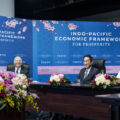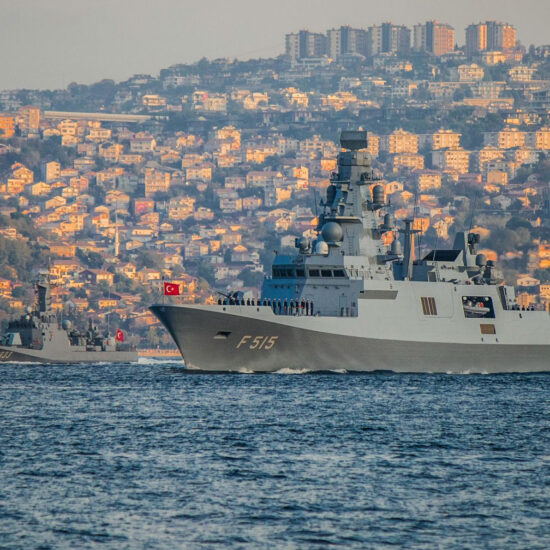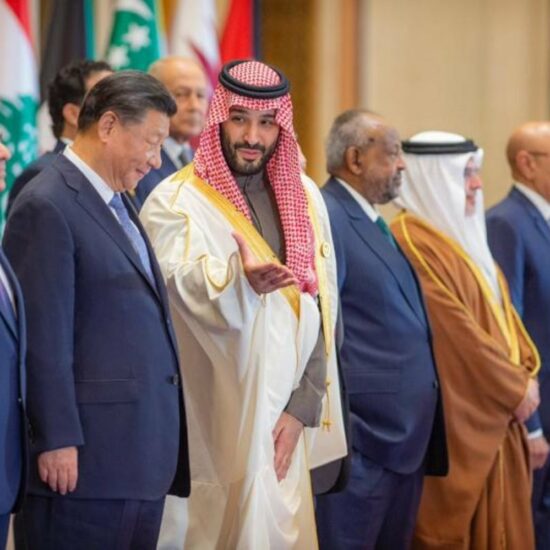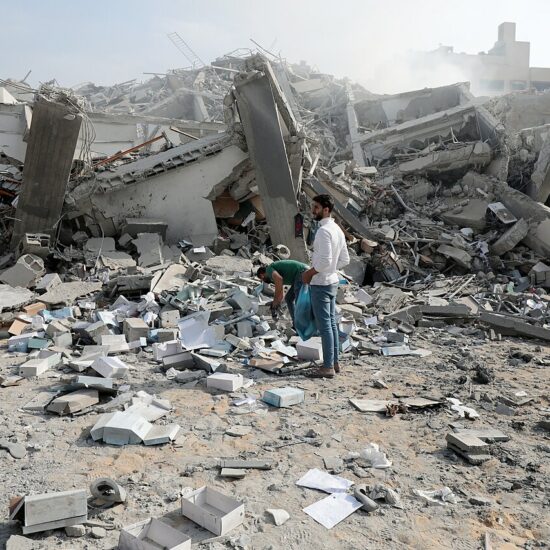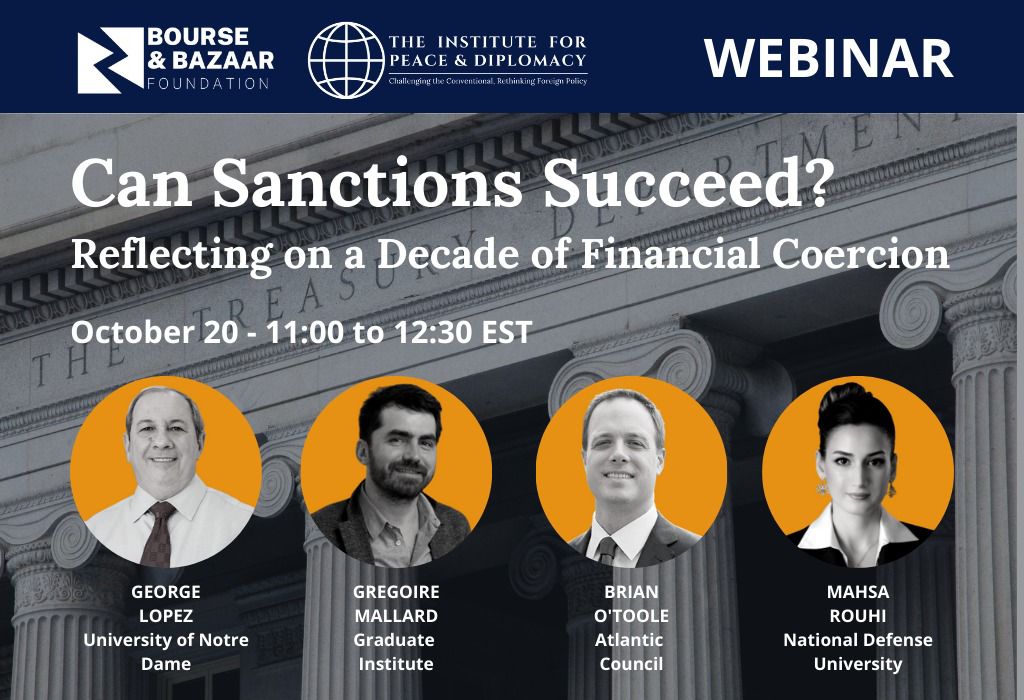
The Institute for Peace & Diplomacy held a timely virtual panel discussion, titled “Can Sanctions Succeed: Reflecting on a Decade of Financial Coercion” in collaboration with Bourse & Bazaar Foundation. The panel discussed how sanctions are applied, how they function, what objectives these sanctions are intended to achieve, and how they have failed and succeeded in achieving their objectives.
Panelists:
- Mahsa Rouhi: Associate Professor and Research Fellow at National Defence University
- George Lopez: Professor Emeritus of Peace Studies at Notre Dame
- Brian O’Toole: Senior Non-Resident Fellow at Atlantic Council
- Gregoire Mallard: Director of Research at Graduate Institute of International and Development
The panel was moderated by Esfandyar Batmanghelidj, Founder and CEO of the Bourse & Bazaar Foundation.
Esfandyar Batmanghelidj began the panel discussion by asking George Lopez – who once wrote on ‘smart sanctions’ in 2002 and favoured the use of sanctions in American foreign policy statecraft – whether sanctions have gotten smarter like Lopez had previously envisioned, amid the substantial increase in the number of US sanctions over the last 20 years. In response, Lopez elaborated that his 2002 writing was against the backdrop of several European summits, held from 1998 to 2002, on the success of targeted sanctions. Lopez argued that “the focus of smarter targeted sanctions by 2002” was to abandon general trade sanctions by being more discreet in applying asset freezes and in the sanctioning of government officials.
Lopez made the case that 9/11 attacks changed the landscape and that terrorism-related sanctions had become the new focus. With 9/11, three big changes happened vis-a-vis “panoply of choices and discrete forms of targeted or smarter sanctions”. The first change concerned the shift away from sanctions being designated against decision-makers and individual leaders to large numbers of people who were implicated in transnational violent terrorist organizations. The second big change was the dollarization of the full global economy and “the weaponization of the dollar: the ability to combine asset freezes with banking sanctions as the real killer of an economy.” The third big change was the wide-spread usage of sanctions by policy-makers, given that “the tools were designed as discrete parts of a menu, and its decision makers who decided oh I don’t have to choose that one…I can choose all six.”
Following Lopez’s remarks, Batmanghelidj turned towards Gregoire Mallard and touched on the role of Europe in pursuing the use of sanctions, stating that while European summits in late 1990s and early 2000s demonstrated favoritism towards sanctions, the continent “has been in a much more reactive role to US sanctions” amid the dollarization of the global economy. More specifically, the moderator asked if sanctions had become less multilateral and whetherEurope still played a role in crafting them.
In response, Mallard stated that there is a difference between financial sanctions and the financialization of sanctions implementation. Financial sanctions can be targeted (and Europe has little issue with these forms of sanctions), while the financialization of the implementation of sanctions have made Europeans reflect on their use, particularly as Europe is thinking more about its sovereignty. Under the latter, the banks are charged with implementing all sanctions and ultimately “have to assess whether there is a jurisdictional risk associated with authorizing a transaction or not.”
To understand how the US claimed territorial jurisdiction with respect to the enforcement of sanctions, one has to look at the dynamics before and after 2008. Mallard stated that “in the 1990s, the European banks acquired the New York branch to clear their worldwide global transactions and they were in charge of servicing the trade-finance economy. So, they (European banks) became vulnerable to these enforcement actions once the OFAC, in 2005, and then 2008, confirmed that if there was a transaction cleared in New York, even though there was no link to the US, it would fall under the jurisdiction of OFAC. Then came the 2008 financial crisis and all these European banks became dependent on the rescue packages of the FED (the US Federal Reserve).” Thus, the Europeans are now more restrained and concerned with the sovereignty of their banking system.
Batmanghelidj then asked Brian O’Toole about the recent sanctions review published by the US treasury. O’Toole responded by stating that “I don’t think there is anything revolutionary in the review itself…triggered in no small part by abuses by the Trump administration over the previous four years.” He asserted that the sanctions tool was abused by the previous administration to designate Chinese military companies and domestic political groups, while using the sanctions to fund the border wall.
The goal of this review is to put sanctions back in its toolbox and focus on international threats, while also establishing a multilateral approach. In response to Mallard, O’Toole argued that the dollarization issue is a much more an economic matter, rather than a sanctions matter, elaborating that “sanctions benefit greatly from the centrality of the US financial system in global cross-border transactions. Whether they’re denominated in dollars or not, they’re going to hit New York almost all the time.”
Batmanghelidj then turned towards Mahsa Rouhi, and asked about how sanctions are perceived by countries that are targeted by sanctions, as these countries don’t necessarily see sanctions as part of diplomacy. Instead, sanctions are viewed as a kind of warfare as experienced during the Trump administration. In response, Rouhi pointed to the panel’s main question, on whether sanctions can succeed, and stated that it depends on what the objectives are.
On one hand, sanctions have succeeded in punishing and inflicting pain on an adversary, but when it comes to arms control, particularly in the case of Iran and North Korea, imposing sanctions and sanctions relief must be taken into account simultaneously. Rouhi explained that “when it comes to sanctions relief, all that exists is that we just on paper lift that sanction but the problem is for the target country to comply and to continue to sustain that compliance on arms control or let’s say in the case of the JCPOA, they need to draw benefits… not because we like those countries…(but because) we need them to find it in their self-interest to comply.” Rouhi explained that this is about the credibility issue, presenting “what the alternative route is if you (the adversary) do what we expect.”
Following Rouhi’s remarks, Batmanghelij’s question concerned sanctions relief being an “afterthought”, even in the 2001 sanctions review. In response, Lopez explained the intended use of smart sanctions, stating that “the atmosphere in the early 2000s was that smart sanctions were the new humanitarian relief that is because of the debacle in Iraq.” From a UN point of view, the US sanctions regime had gotten out of control. In practice, “you couldn’t have both reasonably effective draconian economic measures but a concomitant social medical food crisis at the other level.” Henceforth, US policy-makers had to believe that falling short of a full trade embargo could help improve the economy of a target country, underneath the targeted sanctions imposed on that country’s political leadership. However, Lopez concluded that this ”was a set of assumptions that was quickly proved false for the banking reasons.”
Lopez further criticized the sanctions relief process and asked “why would any even irrational figure like Kim Jong-Un decide after looking at Iraq, Iran, Libya, that it’s in your interest to give up nuclear weapons as a reward for what’s going to happen economically. In fact, there was no economic relief and I think we have a responsibility to think about that as an incentive on the flip side of sanctions for coaxing regimes to be more cooperative with whether it’s non-proliferation or other types of sanctions.”
In response to Lopez’s comments, O’Toole argued that with respect to sanctions relief, Libya primarily benefited from sanctions relief after abandoning its weapons program. With billions of dollars to play with, Ghaddafi took the wrong lesson from sanctions relief and assumed that he had a green light to engage in whatever notorious activity, including the killing of his own people. The re-imposition of sanctions and the overthrow of his regime happened only after Ghaddafi clamped down on protests. O’Toole elaborated that “you’re not dealing with kind of like-minded regimes most of the time. It’s not the US imposing sanctions on France and then France decides to behave better…”. On Iran sanctions, however, it is true that in 2015-2016, the United States did not provide an adequate amount of sanctions relief. The looming election and Donald Trump’s rhetoric, coupled with Iran’s reluctance to join the Financial Action Task Force (FATF), undermined full sanctions relief for Iran, while a Clinton victory could’ve changed that dynamic.
Commenting on O’Toole’s comments, Rouhi argued that due to sanctions, target countries have not learned much about the international financial system and thus lack the knowledge and capability to adopt and reform to new financial standards. Henceforth, one needs to focus on smart and regulated sanctions relief, controlling how target countries receive benefits in the international market. Rouhi stated that such countries cannot unilaterally “figure this out on their own and go after into the international market.” In practice, the US needs to regulate how these countries receive this benefit overtime and effectively regulate sanctions relief, similar to the effort that needs to be put into smart targeting. Such regulations would benefit us and the target countries, as their financial interactions with the outside world would become more systematic.
Following Rouhi’s remarks, Batmanghelidj asked Mallard if the sanctioning country and the targeted country can cooperate to resolve technical issues. Mallard first touched on why sanctions relief is a hard and complex process. He explained that the US treasury simply announcing that a country is not on the sanctions list will not lead to sanctions relief. Banks have become risk-averse and “what we see in the compliance departments of global banks is that usually when someone or some company has been sanctioned once, it’s for life because there’s a risk for instance that this client would be sanctioned back again..” The phenomenon, according to Mallard, is referred to as the “deputization of sanctions implementation to private actors.”
With respect to sanctions exemptions for humanitarian issues, including trade of medicine, there is no multilateral licensing body for such exemptions, despite the JCPOA being enshrined in a UN Security Council resolution. Instead, these US sanctions are observed by OFAC, which has a different compliance culture and might not share the same view on sanctions exemptions with other licensing agencies in France, China, and other countries. Mallard provided an example of “a company (Polish company) in Europe that may want to send [anti-cancer medicine] treatment to Iran”. He said that “they may have to go to the trade licensing authority in Poland to get the export authorization, but will that be enough for them? Yes, but will that be enough for their bank? Maybe not, because the bank may be part of a deferred prosecution agreement in the US and may have to also check that it’s compliant with US sanctions.” Many banks will refrain from taking such risk, and OFAC itself, according to O’Toole is understaffed, will struggle to manage all the licensing processes from around the globe.
Following these remarks, the panel had a Q&A session with the audience members. The Wall Street Journal reporter Ian Talley asked whether “insufficient discipline” within the American financial jurisdiction hinders Washington’s ability to deliver economic statecraft objectives. O’Toole responded by stating that there is compliance among US banks, arguing against the term “insufficient.” While there is a need for structural reforms, O’Toole agreed with Mallard that the US needs to improve the licensing process, stating that the global licensing process under the Trump administration meant that one had to sign over their “firstborn child to get a license from OFAC.”
Batmanghelidj asked another question from the audience on the role of Congress in reforming the sanctions process. In response, Lopez primarily touched on the need for greater coordination within the government, arguing for a sanctions policy council that can serve as a czar in the US to administer sanctions and devote attention to sanctions relief and mitigation when the policy is hurting civilian populations. He further elaborated on the role that Congress can play in setting the rules of conduct. He added that there are members of Congress involved in these talks at the moment. Lopez concluded by stating that “we have a history as a country of immediately after victory in war helping the reconstruction of a country. We’ve never helped the reconstruction of an economy after sanctions.”
Batmanghelidj then asked Mahsa Rouhi about the perspective of targeted countries on the relationship between the executive branch and the Congress, particularly with respect to US sanctions policy. In response, Rouhi argued that targeted countries face a real dilemma when moving forward with domestic structural reforms. On Iran’s compliance with FATF for example, “they have to either adjust their economy to be able to sustain sanctions for a long time and how to actually circumvent sanctions and do those illegal transactions to survive throughout sustaining the sanctions, and then…when they actually want to make an agreement…the prospect of the relief is unclear to them; making that change becomes a very difficult domestic political decision.” Moreover, some in those countries believe that the US is not looking for an agreement, and the agreement itself is a pretext to further expose their transactions, sanction and weaken them, and ultimately make them vulnerable to a military attack.
To resolve these issues, Mahsa suggested the need for an expert-led collaborative council, whether in the United States or on the global stage, where similar to fruitful JCPOA expert discussions, such collaborative measures can help tackle issues surrounding sanctions; a council that may not have authority, but can present alternatives, a roadmap, a timeline, and an endpoint, making it clear to the target country how they can benefit from sanctions relief, or explain which benefits the target country may not see as a result of an agreement.
Finally, panelists concluded this virtual discussion by providing their own advice on sanctions to US policy-makers.
Rouhi pointed out that regardless of when and what type of an agreement the two sides may agree to in the future, with or without the revival of the JCPOA, any viable political settlement will require credible sanctions relief.
Lopez mentioned that the administration has so far avoided strictly enforcing sanctions on Syria and OFAC has started taking certain entities off its list. But moreover, the administration has an opportunity amid the covid-19 pandemic to open up and help the transfer of medical supplies to US adversaries, including the Cubans, Venezuelans, et al.
O’Toole argued that there is little hope for the revival of the JCPOA. Iran has rejected the current framework and wants extra concessions from Washington. He suggested that the negotiators do not need to get impatient while the Iranians are being unrealistic about the nuclear negotiations. If there is a deal to be made, take it, but there are levers with respect to Iranian oil sales to China and the US can further enforce its sanctions regime, while leaving the door of diplomacy open. Also, efforts must be made in strengthening US credibility in providing sanctions relief, which is a key issue.
Mallard stated that regardless of what Iran does, and even if the negotiations fail in a few months, the US should nevertheless review its sanctions policy and unilaterally abandon those sanctions that are effectively designed for regime change and are enforced to inflict maximum pain. For example, the US can authorize European car manufacturers to sell cars to Iran, an issue unrelated to Iranian nuclear policy—doing so would also change the narrative in Iran.
Pouyan Kimiayjan is a Research Associate at the Institute for Peace & Diplomacy

